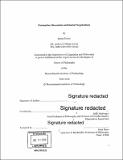| dc.contributor.advisor | Sally Haslanger. | en_US |
| dc.contributor.author | Hesni, Samia. | en_US |
| dc.contributor.other | Massachusetts Institute of Technology. Department of Linguistics and Philosophy. | en_US |
| dc.date.accessioned | 2019-10-04T21:34:03Z | |
| dc.date.available | 2019-10-04T21:34:03Z | |
| dc.date.copyright | 2019 | en_US |
| dc.date.issued | 2019 | en_US |
| dc.identifier.uri | https://hdl.handle.net/1721.1/122428 | |
| dc.description | Thesis: Ph. D. in Linguistics, Massachusetts Institute of Technology, Department of Linguistics and Philosophy, 2019 | en_US |
| dc.description | Cataloged from PDF version of thesis. | en_US |
| dc.description | Includes bibliographical references. | en_US |
| dc.description.abstract | This dissertation lies at the intersection of philosophy of language, social and political, and feminist philosophy. The first half of the dissertation is primarily about the ways language can be used to stereotype, denigrate, oppress, or otherwise harm. The second half is about how language can be used to resist and undermine those harms. In the four chapters of my dissertation, I examine the ways in which language can shape the social world. Language allows people to reinforce social norms and systems like sexism, racism, and oppression more broadly. But it also allows people to disrupt these systems. I argue that it is worth looking seriously at the linguistic mechanisms by which individuals can do both, and the social and political systems in place that enable such language use in the first place. Only by combining the two can we start to get the full story about language, oppression, and power. | en_US |
| dc.description.abstract | Within this broad research program, I am specifically interested in implicit discourse: language that indirectly or implicitly communicates one thing while explicitly stating another. Implicit language is extremely important to understand various mechanisms of linguistic harm and oppression. Chapter 1 examines normative generics like 'boys don't cry,' whose utterances often carry with them an injunction that boys not cry, or a condemnation of crying boys. When someone utters a normative generic like 'women stay at home and raise families,' they are reinforcing a harmful social norm without explicitly using any evaluative terms like 'should, good, right.' In Chapter 2, I problematize philosophical views on silencing, and introduce a new concept of linguistic harm, illocutionary frustration, that occurs when a hearer treats a speaker as though she does not have standing to say what she is saying. | en_US |
| dc.description.abstract | In Chapter 3, I give a meta-philosophical analysis of socially informed philosophy of language. In it, I argue that in the service of intellectual inquiry and social justice, we would do well to incorporate types of social situatedness into our methodological frameworks.. I end in Chapter 4 by reviewing the ways in which social scripts play pivotal roles in enabling interpersonal subjugation, and offer a way out. | en_US |
| dc.description.statementofresponsibility | by Samia Hesni. | en_US |
| dc.format.extent | 130 pages ; | en_US |
| dc.language.iso | eng | en_US |
| dc.publisher | Massachusetts Institute of Technology | en_US |
| dc.rights | MIT theses are protected by copyright. They may be viewed, downloaded, or printed from this source but further reproduction or distribution in any format is prohibited without written permission. | en_US |
| dc.rights.uri | http://dspace.mit.edu/handle/1721.1/7582 | en_US |
| dc.subject | Linguistics and Philosophy. | en_US |
| dc.title | Normative discourse and social negotiation | en_US |
| dc.type | Thesis | en_US |
| dc.description.degree | Ph. D. in Linguistics | en_US |
| dc.contributor.department | Massachusetts Institute of Technology. Department of Linguistics and Philosophy | en_US |
| dc.identifier.oclc | 1120128567 | en_US |
| dc.description.collection | Ph.D.inLinguistics Massachusetts Institute of Technology, Department of Linguistics and Philosophy | en_US |
| dspace.imported | 2019-10-04T21:34:02Z | en_US |
| mit.thesis.degree | Doctoral | en_US |
| mit.thesis.department | Ling | en_US |
